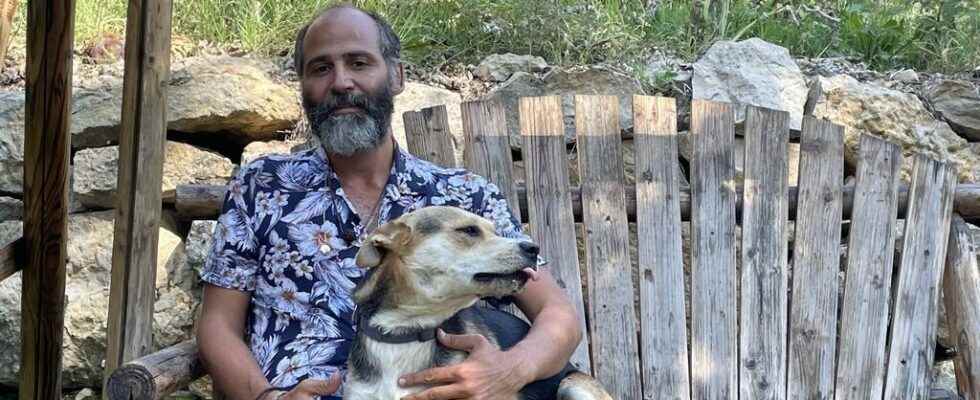At thirty, Philippe Germanos abandoned a promising career in the world of computer programming and chose to return to his native land.
From our correspondent in Beirut,
” Initially, it was family considerations that dictated my choice to take charge of the four-generation-old farm. Then there was this call from the earth, which irresistibly drew me “. In his lush orchard bordering a generous river in the hollow of a valley surrounded by rocky peaks, Philippe Germanos exudes a feeling of calm, harmony and tranquility.
About ten years ago, he chose to take the opposite route by leaving the city for the countryside. This bachelor, however, had all the assets to claim a good career in the great capitals of this world, like thousands of other Lebanese. With a degree in Computer Science from the Lebanese American University in Lebanon and another from Insead in Paris, the job market was wide open to him with interesting opportunities in prospect. He also worked for 5 years in the Lebanese branch of Murex, one of the three largest French software companies.
“Peasant” and proud of it
Today, this 40-year-old man describes himself as ” with pride ” like a ” farmer, a peasant, the noblest profession “. However, his doctor father, a large landowner in the village of Akoura, in the high mountains of Jbeil (Byblos) in Mount Lebanon, had never introduced him to agriculture. ” In my childhood, Akoura represented for me the summer holidays, the river, the family, the ritual of picking apples in September “, he recalls.
When his father died in 2007, he felt compelled to take a closer interest in the family apple, cherry and plum business, entrusted to the management of a local man. ” The land seemed abandoned to me and the yield was quite mediocre, he says. But since someone was taking care of it, it was not an emergency “.
Over time, his attachment to farming grew. “ The earth called me, but I was not aware of it yet, he points out. I looked forward to the weekends and the holidays to leave the city, go up to Akoura, put on my boots and walk the mountains and the orchards “.
This life shared between the city and the countryside lasted 5 years, which Philippe Germanos calls ” the years of apprehensions “, which he nevertheless uses to obtain a diploma from Insead in Paris.
After this time of uncertainty and dilemmas, the young man decided in 2012 and decided to invest himself fully in his new life. ” The call of the earth and the beauty of nature took me away from my computer, he explains. I realized that the earth was not getting the attention it deserved and it disturbed me “.
Years of loneliness and uncertainty
This career change at the age of 30 was not the result of a whim or a whim. “ I gave myself time for this transition. I had the cleanest water, the purest air and heavenly landscapes. I understood that I did not want to remain employed all my life “.
The young man abandons the din of the city and the career behind a console for connectivity with nature and symbiosis with the earth.
In 2012, he took direct control of the management of his agricultural assets. He plants new trees, improves the irrigation system, modernizes the production circuit and explores new markets. Despite encouraging results, Philippe Germanos admits to having gone through difficult times. ” It took me a while to go from city life to rural life “, he confides.
The first three years, he suffers from the loneliness and sometimes from the incomprehension that he encounters with some of his friends. In 2014, the collapse of the Egyptian market, the main outlet for Lebanese apples, and poor production not exceeding 15% of the volume of previous years constitute for him a ” financial shock “.
Instead of giving up, Philippe Germanos is moving forward. ” I was not satisfied with the agro-chemical monoculture model harmful to nature, I was more favorable to permaculture », respectful of natural ecosystems and integrating my way of life to the land.
The concept of agro-tourism
It was at this time that the idea of an agro-tourism project germinated in his mind. With the support of his mother Guita, he transforms the ancestral family residence into a guest house. ” On a personal level, it allows me to diversify my financial resources. At the professional level, I create a community around the land and I educate people to cultivate the fields well and to live in the mountains. he says.
In 2015, Guita Bed&Bloom welcomed its first two clients, an American couple who had come from Jordan to take part in a hike organized by the Lebanon Mountain Track (LMT). Philippe Germanos understood very early on the importance and interest of cooperating with this association which has created mountain walking circuits going from the north to the south of Lebanon. Six years later, the guest house is always full. It welcomes Lebanese residents or from the diaspora, but also foreigners settled in Lebanon or elsewhere. It receives young people from overseas as part of woofing, socio-agricultural volunteering.
Between the guest house and his farm, Philippe Germanos has created a dozen permanent jobs, placed Akoura on the national tourist map and promoted the traditional cuisine of his native region.
His next challenge is to share the values he believes in: simplicity, connectivity with nature, the promotion of earth-friendly agricultural practices through gardening workshops. His greatest achievement, however, was to show a whole generation of Lebanese that a return to the land, so long neglected, is also a way to resist the unprecedented crisis that has brought their country to its knees.
In these paradisiacal landscapes, in the heart of a generous nature, we almost forget that Lebanon is suffering.
